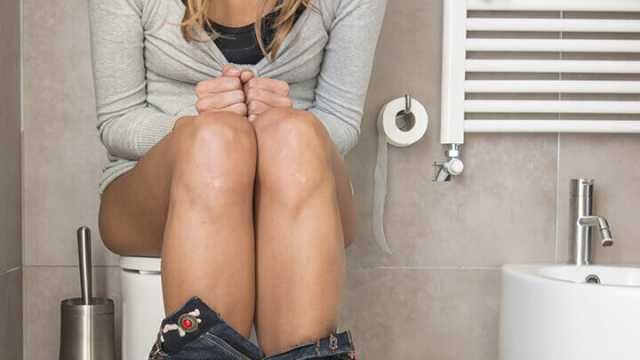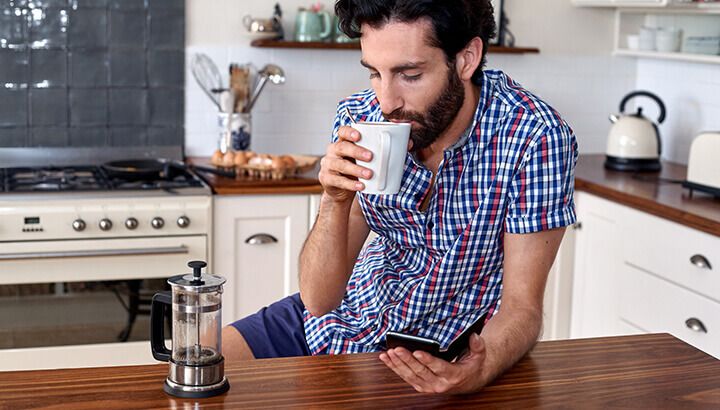
For some, this may not come as a big surprise: coffee and pooping go hand in hand. So, why do we have the urge to poop after drinking coffee? Let’s dive into the reasons behind your morning cup of Joe and your morning poop.
Coffee gives you more than just a buzz
It’s widely known that coffee can have a laxative effect, yet, it’s never been clear why. However, through some very invasive studies, scientists have observed that coffee can stimulate the colon, pushing poop out of the body faster. While we understand how it happens, we’re not entirely sure why it happens. But here’s what we do know.
The mechanism is pretty simple. Coffee creates contractions in your gut. This activates the urge to go, as stool pushes to your rectum, suggests Dr. Satish Rao, director of the digestive health center at Georgia Regents University.
About two decades ago, Dr. Rao and his teams recruited 12 participants to wear anal probes with sensors. These probes measured pressure activity throughout several parts of the colon and rectum. Over the next 10 hours, participants drank the same amounts of caffeinated coffee, decaf coffee and hot water. They also ate a 1,000-calorie burger meal.
While the food triggered the most activity in the subjects’ guts, the researchers were surprised to discover that caffeinated coffee also brought on similar contractions. They were 60 percent stronger than that of hot water and 23 percent stronger than decaffeinated coffee. That showed Rao and his team that caffeine, a known stimulant, plays a role in jumpstarting the colon. But, it’s not simply the coffee. There’s likely some other factors within the beans that are responsible for creating that urge to relieve your bowels, says Rao.
Laxative or diuretic, which is it?

It might seem strange that drinking coffee — which has long been thought to be a diuretic, or dehydrating beverage — can bring on a bowel movement. After all, dehydration is a probable cause for constipation. However, in recent years, scientific research observed that coffee does not have the diuretic properties it was once thought to have.
A study published in the Journal of Human Nutrition and Dietetics found that those who regularly consume coffee tend to build up a strong tolerance for its diuretic properties. In fact, the authors of the study found that the dose of caffeine contained in two to three cups of coffee does not even affect the average amount of urine excreted from the body.
Acidity may be one reason
Coffee has an acidic compound called chlorogenic acid, which triggers high levels of digestive and stomach acid. It may be that the overall acidity pushes out poop more quickly than usual. An earlier study published in Gut, a journal of gastroenterology, found that coffee induces a “gastrocolic response” in certain individuals just prior to consuming their first cup of Joe. The study failed to identify the exact cause of this response, but researchers theorized that coffee somehow affects the epithelial tissue lining the stomach and the small intestine.
Researchers also think that there’s something in coffee that may trigger the release of hormones, aiding in digestion, which in turn, speeds up bowel movements. But, since there are hundreds of chemicals in coffee, science is not clear which chemicals in coffee are actually responsible for that hormone boost. While some health professionals believe it’s the caffeine that causes contractions in the colon, the Gut study found that even decaffeinated coffee acted as a bowel stimulant for some individuals. This then led researchers to conclude that it’s not caffeine, but most likely some other substance that’s responsible for purging the bowels.
And of course, beyond the coffee beans themselves is what we actually put in our coffee. Sweeteners, dairy products or non-dairy additives may also be placing additional pressure on the gut, according to Dr. Jay Kuemmerle, American Gastroenterological Association expert at Virginia Commonwealth University.
Artificial sweeteners can cause bloating, gas and diarrhea. In addition, dairy products like milk, cream and half-and-half contain lactose. This is a known trigger for diarrhea and other gastrointestinal complaints for those who are — knowingly or unknowingly — lactose intolerant.
Chalk it up to morning routine
Researchers also think that the combination of everything in your morning routine plays a factor in pushing your body for a morning “dump.” The colon is twice as active in the morning because of to your body’s circadian rhythms, which are the physical, mental and behavioral changes that follow a roughly 24-hour cycle.
You eat breakfast, drink your coffee and run around organizing your day, all of which may work to spark the colonic contractions. And that’s a good thing, reveals Dr. Kenneth Koch to Women’s Health. Because the key to an efficient and fulfilled poop is having it first thing in the morning, after you wake up.
Strive for regularity

On a side note, another key is regularity. That’s because your bowels like routine. So, it’s good practice to maintain the same pooping schedule daily. So, for those who skip breakfast at home and instead pick up coffee and a muffin on the way to work, there’s a good chance you’re taking a dump in the office restroom each day.
To avoid spending overtime in the office bathroom, hold off on making your coffee run until about two hours after you wake. That way your colon has enough time to calm down. But try not to mess up your pooping schedule. If you do, you’re not only more likely to have a surprise need to poop at an impractical time, you’ll also end up feeling gassy and bloated. So, choose your time wisely — preferably morning — and stick to it.
But wait, you don’t feel the urge to go after drinking coffee?
The laxative effect, it seems, only occurs in 30 to 40 percent of the population. And according to research, that laxative effect lessens over time with habitual coffee consumption. So, drinking more coffee doesn’t necessarily mean you’ll increase the need to “flush out” your system more.
On the other hand, if you are particularly sensitive to coffee, you might want to cut back on your morning dose. Drinking more than two or three cups per day can lead to diarrhea for some, suggests the International Foundation for Functional Gastrointestinal Disorders. Switching to decaf brew may help lessen the effect — but not eliminate it altogether.
The bottom line, there’s a good chance coffee helps rev-up our systems each morning. We crave our daily fix. In the U.S., we crave it so much that we drink an estimated 400 million cups a day. That’s a lot of coffee. And since America has such a passionate obsession with coffee, a routine bodily function isn’t necessarily a bad thing, particularly when it’s sparked from something that also gives us so much pleasure each day.
— Katherine Marko

